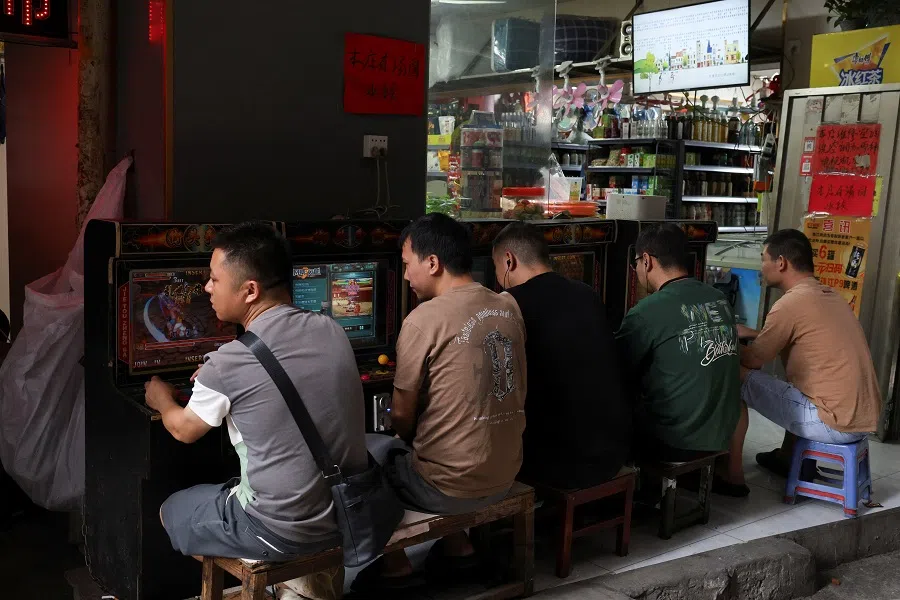Revenge on Gold Diggers: China’s hottest game sparks gender war
A new video game in China has reignited the gender debate, with its premise of women as “gold diggers”. Is it misogynistic, or realistic? Lianhe Zaobao’s China Desk looks at the line between raising fraud awareness and pointing fingers.

The digital game Revenge on Gold Diggers, which went online recently, has sparked a fresh wave of gender war on the Chinese internet, due to the term “gold digger” (捞女 lao nv) in its title.
Revenge On Gold Diggers was released on the gaming platform Steam on 19 June. It is produced by Hong Kong director Mark Wu, known for his work on Category III films, and is touted as China’s first interactive emotional anti-fraud full-motion video game.
The game is described on the platform as: “You (the player) will play as the protagonist Wu Yulun, a man who was once deeply hurt by ‘gold diggers’, and is determined to use himself as bait to fight back against a gold digger organisation of ‘emotional hunters’. Step into this grey area called love, navigate between several glamorous and highly adept female characters, and experience an emotional hunt that is gripping with every step.”
In simpler terms, it is a role-playing game where players act as an “emotional hunter” looking to counter the “gold digger organisation”.
Sparking an online storm
What is a 捞女? According to Baidu Baike, the Chinese term originated from the Guangdong locals’ term for outsiders seeking their fortune in Guangdong, 捞松 (old fellow). Nowadays, it is mainly used to describe materialistic women who want to take advantage of every situation to make a quick buck; in short, a gold digger.
... in today’s online environment, where gender opposition is a contentious issue, naming the game Revenge on Gold Diggers was as good as digging a hole for themselves.

However, the game’s producer, Mu Fei, explained on Steam that the game’s characters are intentionally “grey” and morally complex, stating, “We used stereotypical labels combined with layered personalities as a design formula. These characters can love and hate, and players can learn by understanding them... psychology, sociology, communications, and other fields are all part of the game.”
The game is said to be inspired by the real-life experiences of team members. A comment feature will allow players who wish to share their own experiences to do so, even allowing them to have their stories included in the game’s “romance files”.
Mu acknowledged that love is a complex topic, but said the game’s scope naturally limits how deeply it can be explored. Still, the game chooses to address it — however briefly — rather than ignore it entirely.
Based on the statements above, the game developers intended to explore the broader and more complex issue of gender relations. However, in today’s online environment, where gender opposition is a contentious issue, naming the game Revenge on Gold Diggers was as good as digging a hole for themselves.
Sure enough, within 24 hours of its release, Revenge On Gold Diggers sparked an online storm.
... does the male protagonist interacting and navigating between several female characters perpetuate the objectification of women?

The criticisms and doubts from netizens mainly revolved around three points. First, why use “gold digger” in the game’s title; is it a vilification of women? Second, does the male protagonist interacting and navigating between several female characters perpetuate the objectification of women? Third, does the forced link between emotional fraud and women reflect misogynistic or anti-women sentiment, and is it a deliberate attempt at inciting gender opposition?
On the flip side, several netizens believed that these accusations and doubts are unfair. “How does ‘gold digger’ equate to misogyny or anti-women? Where’s the logic?”
“Would men criticise a game if it were titled ‘Womaniser Game’? ”
“This is just to raise awareness of anti-fraud, how is it related to women’s rights?”
Media criticises game as misogyny
As the debate raged on, the accounts of Revenge on Gold Diggers on major social media platforms were banned, and director Mark Wu’s account on the video website Bilibili was also suspended. In response, news outlet Jimu, under the Hubei Daily Media Group, ran a commentary titled “Revenge On Gold Diggers producer has Bilibili account closed; banking on gender opposition for online traffic leads only to disaster”, alleging that the essence of the game is not anti-fraud but “misogyny”.
The game’s plot is filled with objectification of women, simplifying a complex social issue into a gender war and rendering all women as a “symbol” of fraud. — Jimu, a news outlet under Hubei Daily Media Group
The article pointed out that while the game claims to unveil the truth about emotional fraud, it uses the malicious term “gold digger” to target all women. The game’s plot is filled with objectification of women, simplifying a complex social issue into a gender war and rendering all women as a “symbol” of fraud.

The article highlighted that the quick banning of the game director’s account showed prompt control over public opinion risks, but seemed more like crisis management than true governance. It called for improved content review mechanisms, stricter standards for content involving gender discrimination and stigmatisation, and better quality checks on developers to prevent the exploitation of social issues.
The published commentary intensified the debate around the game and quickly escalated the associated controversies.
Promoting ‘rational love’ and ‘emotional security’?
While Wu has yet to publicly respond, the game developers have quietly renamed the game Emotional Fraud Simulator (情感反诈模拟器) a day after its launch, dropping the controversial term “gold digger”. An article on WeChat official account Youxi Dongli (游戏动力, lit. Game Power), which garnered over 100,000 views, also noted that the game’s message board feature for players to share personal stories was removed the same day.
Just when the public thought that this would mark the demise of the game, an article on Beijing Youth Daily shifted the narrative.
Titled “Emotional Fraud Simulator: Building a Solid Defence for Youths in Marriage and Relationships in Innovative Ways” (《情感反诈模拟器》:以创新形式筑牢青年婚恋安全防线), the article argued that the game is not only an innovative tool against fraud but also a vehicle for promoting relationship civility. By exposing the essence of scams like false personas and emotional manipulation, it reinforces the ethical baseline of “sincerity as a cornerstone of relationships”. Through story modules like “Financial Entanglements” and “Overcoming Crises Together”, it guides players to deepen their understanding of the reciprocity of rights and obligations. Using character interactions as a link, the game allows players to understand the modern values of respecting boundaries and equal communication in relationships.
It provides new ideas for combating romance scams and promotes the concepts of “rational love” and “emotional security”. — an article in Beijing Youth Daily

The article further stated that the gameplay design of “first exposing the tricks, then conveying the right path one should take” allows youths to not only master anti-fraud techniques but also have a deeper understanding of the essence of positive relationships. This innovative interactive game actively responds to the Cyberspace Administration’s “Clear and Bright” campaign aimed at rectifying online misconduct. It provides new ideas for combating romance scams and promotes the concepts of “rational love” and “emotional security”.
This commentary was republished by Xinhuanet and the China National Radio website, but can no longer be found on the latter.
So what is love in the internet age?
The verbal sparring between Jimu and Beijing Youth Daily highlights the increasing sensitivity of gender issues in China’s online discourse. In fact, the sensational “Fat Cat” suicide incident last year had already sparked widespread discussion of the term “gold digger”.
“Fat Cat” was the online handle of Liu Jie, a 21-year-old male from Hunan. He met and fell in love with a woman online, but they later broke up. He unsuccessfully tried to reconcile, and in early April last year, committed suicide by jumping into a river in Chongqing.
The incident did not attract much attention at first. However, as Liu’s family continued to expose more details, such as accusing his ex-girlfriend of repeatedly demanding money from him, which forced him to live frugally, waves of online discussions were sparked. Among them was the debate over whether Liu’s ex-girlfriend was a gold digger. Some netizens believe that several details in the game echoed elements of the “Fat Cat incident”.
The controversy sparked by the game is a microcosm of the current gender divide in China: both men and women feel they are the underprivileged ones, desperately trying to prove they are being bullied and exploited...

The controversy sparked by the game is a microcosm of the current gender divide in China: both men and women feel they are the underprivileged ones, desperately trying to prove they are being bullied and exploited. When it comes to gender issues, the debates are even fiercer and more relentless, with each side determined to win. Amid the chaotic arguments and “choosing sides”, the essence of the issue no longer seems to be that important.
After the “Fat Cat incident” triggered a wave of criticism against gold diggers, a police report later revealed that Liu had a genuine romantic relationship with his ex-girlfriend and that the latter did not maliciously defraud Liu of his assets. The People’s Daily said on Weibo: The truth is more important than internet traffic; don’t fall prey to it.
Currently, the emotional anti-fraud game, which uses gold diggers as a gimmick, faces scepticism and criticism in online discussions, yet it has simultaneously risen to the top of Steam’s China bestseller chart and achieved a high global ranking.
Do gender issues hold the key to gaining traffic, or are they a creative minefield? Does the ensuing debate help promote gender equality, or does it exacerbate divisions and conflicts? The game Revenge On Gold Diggers is not the first incident to ignite a gender war, and neither will it be the last straw to stop related controversies on the Chinese internet.
This article was first published in Lianhe Zaobao as “《捞女游戏》引爆新一轮性别战争”.





![[Big read] When the Arctic opens, what happens to Singapore?](https://cassette.sphdigital.com.sg/image/thinkchina/da65edebca34645c711c55e83e9877109b3c53847ebb1305573974651df1d13a)